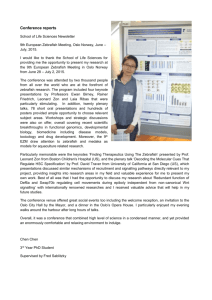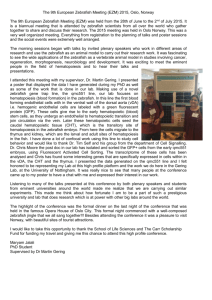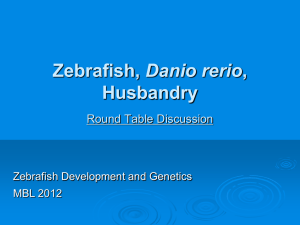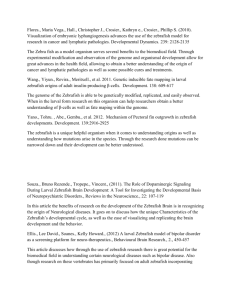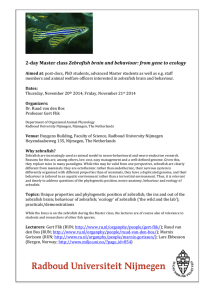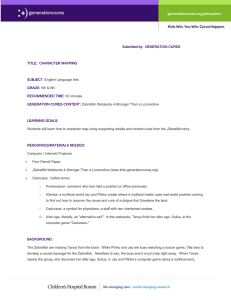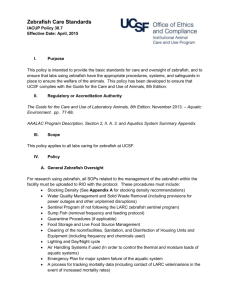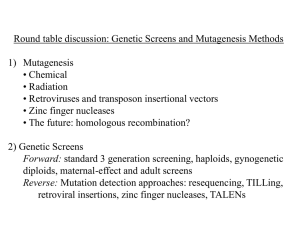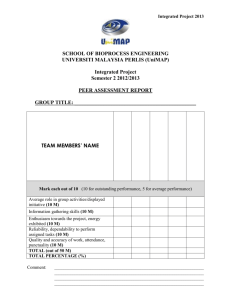Malaysia Zebrafish Disease Models Workshop
advertisement
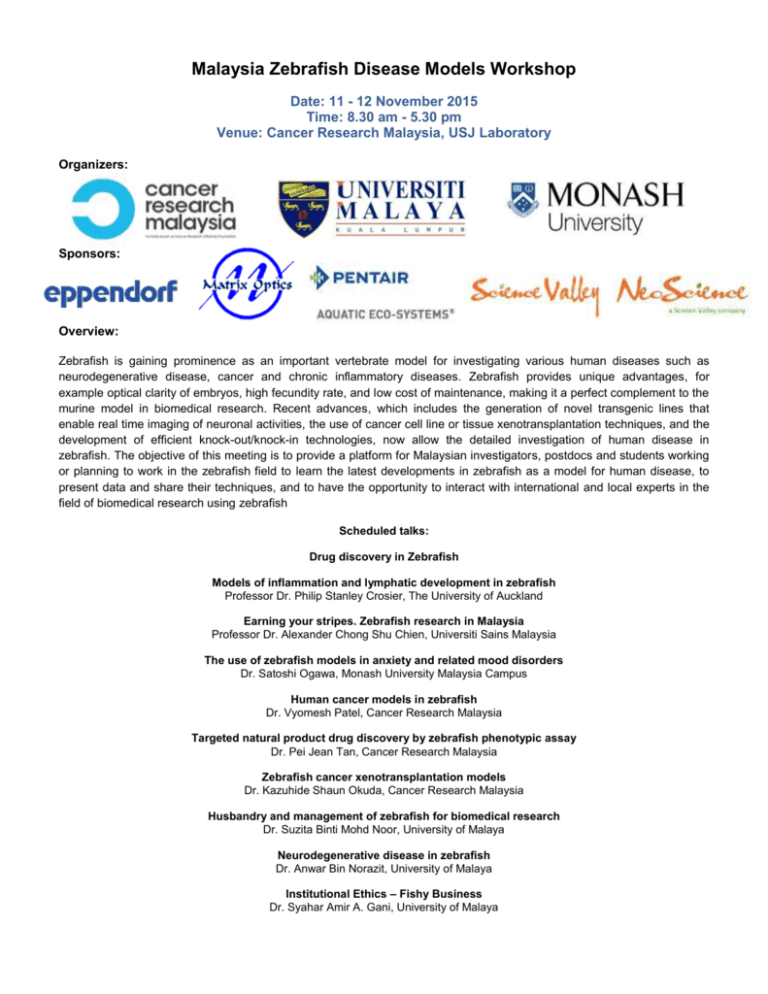
Malaysia Zebrafish Disease Models Workshop Date: 11 - 12 November 2015 Time: 8.30 am - 5.30 pm Venue: Cancer Research Malaysia, USJ Laboratory Organizers: Sponsors: Overview: Zebrafish is gaining prominence as an important vertebrate model for investigating various human diseases such as neurodegenerative disease, cancer and chronic inflammatory diseases. Zebrafish provides unique advantages, for example optical clarity of embryos, high fecundity rate, and low cost of maintenance, making it a perfect complement to the murine model in biomedical research. Recent advances, which includes the generation of novel transgenic lines that enable real time imaging of neuronal activities, the use of cancer cell line or tissue xenotransplantation techniques, and the development of efficient knock-out/knock-in technologies, now allow the detailed investigation of human disease in zebrafish. The objective of this meeting is to provide a platform for Malaysian investigators, postdocs and students working or planning to work in the zebrafish field to learn the latest developments in zebrafish as a model for human disease, to present data and share their techniques, and to have the opportunity to interact with international and local experts in the field of biomedical research using zebrafish Scheduled talks: Drug discovery in Zebrafish Models of inflammation and lymphatic development in zebrafish Professor Dr. Philip Stanley Crosier, The University of Auckland Earning your stripes. Zebrafish research in Malaysia Professor Dr. Alexander Chong Shu Chien, Universiti Sains Malaysia The use of zebrafish models in anxiety and related mood disorders Dr. Satoshi Ogawa, Monash University Malaysia Campus Human cancer models in zebrafish Dr. Vyomesh Patel, Cancer Research Malaysia Targeted natural product drug discovery by zebrafish phenotypic assay Dr. Pei Jean Tan, Cancer Research Malaysia Zebrafish cancer xenotransplantation models Dr. Kazuhide Shaun Okuda, Cancer Research Malaysia Husbandry and management of zebrafish for biomedical research Dr. Suzita Binti Mohd Noor, University of Malaya Neurodegenerative disease in zebrafish Dr. Anwar Bin Norazit, University of Malaya Institutional Ethics – Fishy Business Dr. Syahar Amir A. Gani, University of Malaya Scheduled practical sessions: Zebrafish injection (Sponsored and coordinated by Eppendorf) Zebrafish imaging (Sponsored and coordinated by Matrix Optics) Workshop Speakers: Professor Dr. Philip Stanley Crosier (The University of Auckland) Prof. Crosier is Professor of Molecular Medicine in the School of Medical Sciences, at University of Auckland, New Zealand. His laboratory uses the zebrafish model to study several human disease processes in the area of innate immunity, hematopoietic stem cell development, cancer, and lymphangiogenesis. For this research, his laboratory has generated several transgenic zebrafish lines that mark cellular compartments such as neutrophils and haematopoietic stem cells. Prof Crosier is also an international expert in the field of drug discovery and has published in high impact journals such as Nature, Cell Metabolism, and Cell Stem Cell. Professor Dr. Alexander Chong Shu Chien (Universiti Sains Malaysia) Prof. Chong is Professor in the School of Biological Sciences, at Universiti Sains Malaysia. He is also the Director of Center of Chemical Biology, Universiti Sains Malaysia. His research focus is in the field of aquaculture, developmental biology and stem cell research, all using zebrafish as a model. Prof Chong has also established a novel method of generating embryonic stem cell-like cells from zebrafish. His work is published in renowned journals such as PloS ONE, Zebrafish, and Developmental Biology Dr. Satoshi Ogawa (Monash University Malaysia Campus) Dr. Ogawa is senior research fellow in the Brain Research Institute, Jeffrey Cheah School of Medicine and Health Sciences, at Monash University Malaysia. His current research interest is to understand the neural mechanism linking emotion and addiction utilizing molecular morphology, behavioural, optogenetics and neuroimaging approaches. Dr Ogawa has published in internationally renowned journals such as Endocrinology, Journal of Neurochemistry, and PNAS. He has received the Jimmie Dodd Memorial Prize for Comparative Endocrinology Dr. Vyomesh Patel (Cancer Research Malaysia) Dr. Patel is the group leader of the drug discovery and the nasopharyngeal cancer groups, at Cancer Research Malaysia. He has ~30 years experience in cancer research and has contributed in elucidating the molecular mechanisms involved in head and neck cancer metastasis. His current research interests are identifying relevant molecules that provide clues to cancer development and progression. Also, to use this information to identify molecular markers that may have value as targets for developing novel anticancer therapies in animal models including zebrafish. Dr Patel has published in high impact journals such as Clinical Cancer Research, Developmental Cell, and Cancer Research. Dr. Tan Pei Jean (Cancer Research Malaysia) Dr. Tan is a postdoctoral scientist in the drug discovery group, at Cancer Research Malaysia. She has developed a hyphenated platform utilizing the analytical and mass spectrometer coupled with bioassays for the rapid identification of bioactive small molecules, from natural product extracts. Her current research interests include identification and characterization of target specific natural products using zebrafish as a model. Dr Tan has published in notable journals such as Analytical Chemistry, Current Cancer Drug Targets, and Phytochemical Analysis. Dr. Kazuhide Shaun Okuda (Cancer Research Malaysia) Dr. Okuda is a postdoctoral scientist in the drug discovery group, in Cancer Research Malaysia. He has contributed to the generation of novel transgenic zebrafish lines that mark the lymphatic vessels in zebrafish. His current interests are on identifying and characterizing potential anti-cancer compounds from natural product screens using transgenic zebrafish lines that fluorescently mark the vasculature system. In addition, he is interested in establishing novel cancer models in zebrafish. Dr Okuda has published in international journals such as Development, Developmental Dynamics, and Nature. Dr. Suzita Binti Mohd Noor (University of Malaya) Dr. Suzita is senior lecturer in the Department of Biomedical Science, Faculty of Medicine, University of Malaya, Malaysia. She has contributed in elucidating the mechanisms involved in embryonic hematopoiesis and identified novel anti-angiogenic inhibitors using the zebrafish model. Her current interest includes investigating the role of neurotrophic factors in embryonic development and neuroprotection. Dr. Suzita has published in international journals such as the Journal of Immunology, PLoS One, and Drug Design, Development and Therapy. Dr. Anwar Bin Norazit (University of Malaya) Dr. Anwar is senior lecturer in the Department of Biomedical Science, Faculty of Medicine, University of Malaya, Malaysia. He has contributed in elucidating the mechanisms involved in various neurological disorders such as glial protein aggregate diseases and brain injury. His current interest includes identifying novel therapeutic strategies for neurodegenerative disease using zebrafish as a model. Dr Anwar has published in notable journals such as Neuroscience, Brain Research, and Molecular and Cellular Neuroscience. Dr. Syahar Amir A. Gani (University of Malaya) Dr. Syahar is a Veterinary Officer in the Animal Experimental Unit (AEU), Faculty of Medicine, University of Malaya and member of Faculty of Medicine Institutional Animal Care and Use Committee (FOM-IACUC). Prior to joining University of Malaya, Dr. Syahar was an Aquarium Veterinarian at the Underwater World Langkawi, Malaysia. Currently, Dr. Syahar is responsible for animal laboratory husbandry and assists researchers in designing animal research protocols as well as in bio risk management. His primary responsibility is to ensure the AEU maintains their accreditation by the Association for Assessment and Accreditation of Laboratory Animal Care (AAALAC) International. Registration Form: Name Click here to enter text. Company/Institution Click here to enter text. Designation Click here to enter text. Student/Full Click here to enter text. Telephone/Mobile Click here to enter text. Fax Click here to enter text. Email Click here to enter text. Dietary requirements Click here to enter text. Oral/Poster Click here to enter text. Registration and payment: Please provide your information in the registration form above and after email to zebrafish@cancerresearch.my. To provide a suitable a platform for facilitating exchange of scientific ideas and research collaborations, we encourage all participants to submit an abstract for selection for either oral or poster presentation. Interested participants are required to include an abstract (no more than 500 characters excluding title, author list, and author affiliation) together with the registration form. Registration and payment closing date: 30th September 2015 Fees: Full registration: RM 690, Student registration (with proof of student ID): RM 480 (all inclusive of GST) [Fees include workshop material, refreshments and lunch] Please note, space is limited for this workshop and prior payment is required in order to secure a place. Bank cheque payment Bank/Telegraphic transfer Please make cheques payable to: Cancer Research Initiatives Foundation Maybank account: 514299123613 Branch Address: Wisma, Sime Darby, KL. Swift Code: MBBEMYKL Payee Name: CANCER RESEARCH INITIATIVES FOUNDATION Mail to: Cancer Research Malaysia USJ Laboratory 12A, Jalan TP 5, Taman Perindustrian UEP, 47600 Subang Jaya, Selangor Darul Ehsan. Attn to: Dr. Peijean Tan Include name of attendee and reference to zebrafish workshop It is important to notify us by email immediately after bank/telegraphic transfer is made via email for GST purposes.
